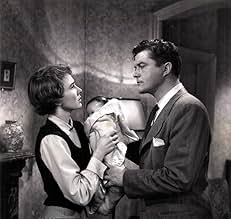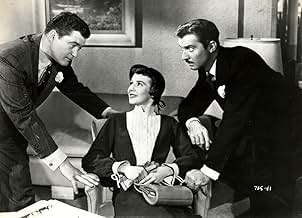Adicionar um enredo no seu idiomaA working girl rises in an ad agency after impressing a baby-food client with her lifelike dolls.A working girl rises in an ad agency after impressing a baby-food client with her lifelike dolls.A working girl rises in an ad agency after impressing a baby-food client with her lifelike dolls.
- Direção
- Roteiristas
- Artistas
- Peggy
- (as Sheila Stephens)
- Train Passenger
- (não creditado)
- Danny
- (não creditado)
- Subway Commuter
- (não creditado)
- Club Patron
- (não creditado)
- Traffic Cop
- (não creditado)
- Passerby
- (não creditado)
- Passerby
- (não creditado)
Avaliações em destaque
This is 1950, so women have been "liberated" and male chauvinism is a thing of the past. Where men formerly gave up their seats to women on buses and trollies, the liberated women now fend for seats with the men. Betsy Drake's Douglas is all for the progress that has been made, but she would have preferred that some of the old manners hadn't been thrown out with women's "liberation."
The scenes with Patsy's doll baby and a few others have some comedy. But there's nothing here to evince rollicking laughter. Edmund Gwenn is very good as the grumpy Cyrus Baxter. Some may think that Gwenn is out of his usual character (i.e., his Kris Kringle from "Miracle on 34th Street"), but Gwenn was an accomplished actor who played diverse roles - including some grouchy or distasteful characters.
The other leads, Zachary Scott as Barry Holmes and Dennis Morgan as Sam Morley, are okay up to a point. But Morley's falling for Patsy just isn't believable. There's nothing in the screenplay to even give a hint of romantic inclination on Morley's part - although there is on Patsy's part initially. All of his encounters have been with a fumbling, accident-prone Patsy. He has been upset with her and even though a plot twist leads to her keeping her job, there's nothing romantic until the very end when Morley just suddenly falls for Patsy. It actually came across as a dumb, poor ending as though the writers couldn't think of anything better.
And that gets to Betsy Drake. While she made a few comedies, she had a certain innocence yet intelligence about her persona. So, one tends to like the characters she plays. But she definitely is not a laugh-inducing comedienne. Nor does she have a personal that suggests or invites romance.
As I said, it's a stretch to give this six stars, but most people should enjoy the film and may find it somewhat amusing.
Certainly, Drake and Gwenn don't lack for sparkle. The trouble is the humorous situations seldom get the comedic bounce they need. As a result, the set-ups tend to fade into the narrative itself. I suspect director Windust simply lacks the right touch for comedy, which I also suspect is harder to do than drama. Then too, the usually lively Dennis Morgan appears oddly distracted, while the usually villainous Zachary Scott shows he's not entirely out of place.
Anyway, the movie's a good glimpse into the coming consumer age through the medium of an advertising agency. And catch how sensitive the norms of the period are to unwed motherhood. In fact, take away the unwed part, and much of the story would collapse. From these standpoints, the movie's a good foreshadowing of the 1950's as a whole—though it's likely the charming Drake didn't fit the coming age of Marilyn's, Jayne's, and Mamie's. Too bad, because as the deserving working girl in this film she's darn near perfect.
Overall, the movie manages some clever set-ups, a few chuckles, but most of all, a good glimpse of its time period.
Patsy (Betsy Drake) is a ditsy and somewhat annoying lady. She is terrible at her job and it isn't surprising when she's fired from the advertising agency where she works. However, what her bosses don't realize is that she has a man who is very smitten with her. No, he's not attracted to her specifically but he thinks she's a terrific mother and is raising a wonderful baby. There is a problem with this...she isn't a mother and doesn't have a baby. What actually happened is that in order to get a seat on the subway, she wrapped a doll up like a baby...knowing that men will give up their seats to a 'mother'!
So what about this man? Well, he's Cyrus Baxter (Edmund Gwenn)...the advertising agency's top client. And, he's taken with the lady because when they talk on the subway, he asks about her 'baby' and she tells him she named it 'Cyrus Baxter Douglas'. Why this name? Well, she panicked and chose the name of the guy so important to her company...not knowing the man on the train IS Cyrus Baxter! Now, he wants to be her benefactor and this nasty old man suddenly begins to behave like a nice old man!
As for her job, when the bosses realize that Baxter LIKED Ms. Douglas, they hire her back and give her a raise AND a promotion. What's next for these folks? See the film.
The film is filled with wonderful moments...particularly when grouchy old Mr. Baxter takes a paternalistic attitude towards her and the 'baby'. But again and again, the film starts touching you...and then manages instead to not quite seal the deal. The tender, sweet or funny moments often are punctuated with folks yelling at each other...which severely impacts on the overall story.
Patsy is such a weird character. Betsy Drake doesn't seem like a comedian to pull it off but her natural sincerity really sets this off. She may have gotten the job due to her husband Cary Grant but she's actually weirdly funny in her unreal antics. The confusion is worthy of the craziest screwball comedies. The romance is a little stuck on. If only Cary Grant joined his wife. That part is a little clunky.
Você sabia?
- CuriosidadesThe stack of baby photos which they sort through includes one used in A Canção da Vitória (1942) eight years earlier.
- Erros de gravaçãoAlmost an hour in, as Zachary Scott is convincing Betsy Drake to present Sam's campaign to Cyrus Baxter, he leads her out of the office door, saying, "Now remember, Patsy, the code of the firm..." As Sam's office door closes, at the top of the door can be seen the very bright studio lights that were used to light the scene before."
- Citações
Caravan Club Waiter: [at the Caravan Club Morley is at the table while Holmes dances with Patsy] Fresh drink, sir?
Sam Morley: Yes, a double. And, waiter...
[takes out some money]
Sam Morley: here's ten dollars for your trouble. Go to the dance floor and tell Mr. Holmes he's wanted on the phone.
Caravan Club Waiter: Sorry, sir. Mr. Holmes gave me twenty dollars *not* to call him to the phone. Anything else, sir?
Sam Morley: [puts money back] A sharp knife.
- ConexõesReferenced in I Love Lucy: The Fashion Show (1955)
- Trilhas sonorasPretty Baby
(uncredited)
Music by Egbert Van Alstyne and Tony Jackson
Lyrics by Gus Kahn
Played during the opening credits and occasionally in the score
Sung by Dennis Morgan
Principais escolhas
Detalhes
- Data de lançamento
- País de origem
- Idioma
- Também conhecido como
- La linda embustera
- Locações de filme
- Empresa de produção
- Consulte mais créditos da empresa na IMDbPro
- Tempo de duração1 hora 32 minutos
- Cor
- Proporção
- 1.37 : 1
































